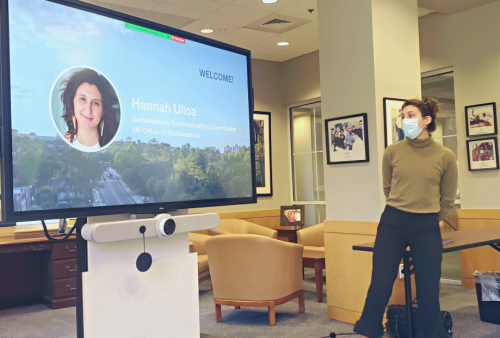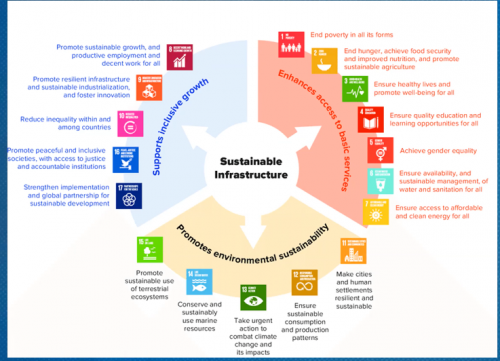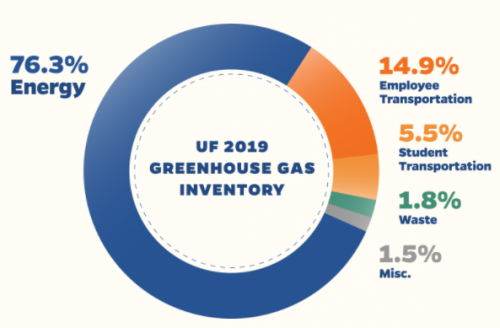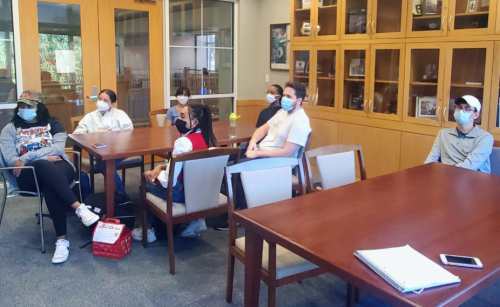 This past December, Hannah Ulloa, Sustainability and Communications Coordinator at the UF Office of Sustainability led the second seminar for TESI’s Environmental Leaders Fellows.
This past December, Hannah Ulloa, Sustainability and Communications Coordinator at the UF Office of Sustainability led the second seminar for TESI’s Environmental Leaders Fellows.
The cohort of 12 students from diverse majors and backgrounds will gain the knowledge, skills and confidence to advocate for the planet in their respective careers over the course of this fellowship. Ulloa gave the students an overview of sustainability initiatives at UF, including an introduction to the Office of Sustainability, an overview of UF’s Climate Action Plan, and ways that the students can get involved on campus.
Her presentation opened with a question that seems simple — what is sustainability? But, it turns out there is a lot more nuance to the subject than most people realize. She shared the 17 sustainable development goals adopted by the United Nations — a framework similar to the  one that is followed at UF. In striving to achieve these goals, UF can promote environmental sustainability, enhance access to basic services, and support inclusive growth through many areas of impact including climate action, infrastructure, social equity, and more. The Office of Sustainability asserts that transformational change is based in culture change, meaning there is a large focus on connecting groups across campus and helping them to move sustainable practices forward.
one that is followed at UF. In striving to achieve these goals, UF can promote environmental sustainability, enhance access to basic services, and support inclusive growth through many areas of impact including climate action, infrastructure, social equity, and more. The Office of Sustainability asserts that transformational change is based in culture change, meaning there is a large focus on connecting groups across campus and helping them to move sustainable practices forward.
Another question Ulloa asked the students was, “What is the first thing you think of when you hear climate action?” Students gave a variety of answers from “policy”, to “grassroots”, to “expensive.” The exercise showed students how climate action can mean something different to everyone, depending on a variety of different factors.
“It can mean different things, depending on what institution you’re at it can mean something different, depending on where you are in the world,” Ulloa said.
With these considerations in mind, UF’s Climate Action plan (originated in 2009) is currently undergoing revisions “in order to reach carbon neutrality, as well as improving the university’s resilience to related climate change impacts.” The process of revamping the plan involves many people — six working groups, an advisory board, and a variety of stakeholders including UF students, staff and faculty. This gives facilitators a variety of diverse opinions to consider when drafting their plans.
 According to the 2019 UF Greenhouse Gas Inventory, the largest area of concern for UF is energy, which makes up 76.3% of UF’s emissions. The majority of UF’s energy consumption comes from the heating and cooling of buildings on campus. This will be a major focus of a new central energy plant for UF once the current Duke energy plant is decommissioned in 2027. Other improvements to reduce energy consumption in buildings include light sensors, a schedule for HVAC and lighting use, and equipment upgrades. The second highest cause of emissions for UF is transportation, comprising 14.9%. In this area, UF will improve already existing transportation alternatives such as bus systems, Zipcar, and increased electric vehicles.
According to the 2019 UF Greenhouse Gas Inventory, the largest area of concern for UF is energy, which makes up 76.3% of UF’s emissions. The majority of UF’s energy consumption comes from the heating and cooling of buildings on campus. This will be a major focus of a new central energy plant for UF once the current Duke energy plant is decommissioned in 2027. Other improvements to reduce energy consumption in buildings include light sensors, a schedule for HVAC and lighting use, and equipment upgrades. The second highest cause of emissions for UF is transportation, comprising 14.9%. In this area, UF will improve already existing transportation alternatives such as bus systems, Zipcar, and increased electric vehicles.
Ulloa hopes that with this information, students will be able to identify overlaps within the work they are doing for their  program, or other opportunities to participate with campus climate initiatives. Arran Wass-Little, a fellow studying economics and data science, mentioned that one way he could connect UF’s Climate Action Plan to his studies was to learn how data connects to the new plan, and then use it to measure the plan’s effectiveness. Another student observed how they already see the impact of UF’s efforts on their daily lives, such as increased sustainability efforts in campus libraries, the introduction of electric scooters, and improved bus schedules. Ulloa introduced students to the concept of institutional change and how to be an agent of change. She suggested that students could contribute to the campus climate effort by working on how to communicate climate science to fellow students, surveying student transportation methods, and working with students to build connections around climate action.
program, or other opportunities to participate with campus climate initiatives. Arran Wass-Little, a fellow studying economics and data science, mentioned that one way he could connect UF’s Climate Action Plan to his studies was to learn how data connects to the new plan, and then use it to measure the plan’s effectiveness. Another student observed how they already see the impact of UF’s efforts on their daily lives, such as increased sustainability efforts in campus libraries, the introduction of electric scooters, and improved bus schedules. Ulloa introduced students to the concept of institutional change and how to be an agent of change. She suggested that students could contribute to the campus climate effort by working on how to communicate climate science to fellow students, surveying student transportation methods, and working with students to build connections around climate action.